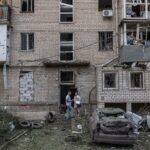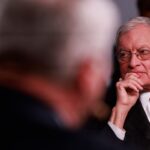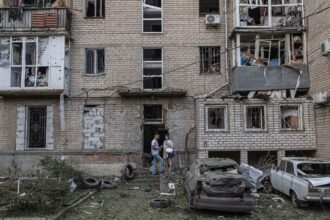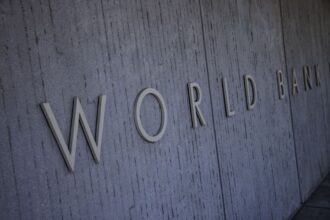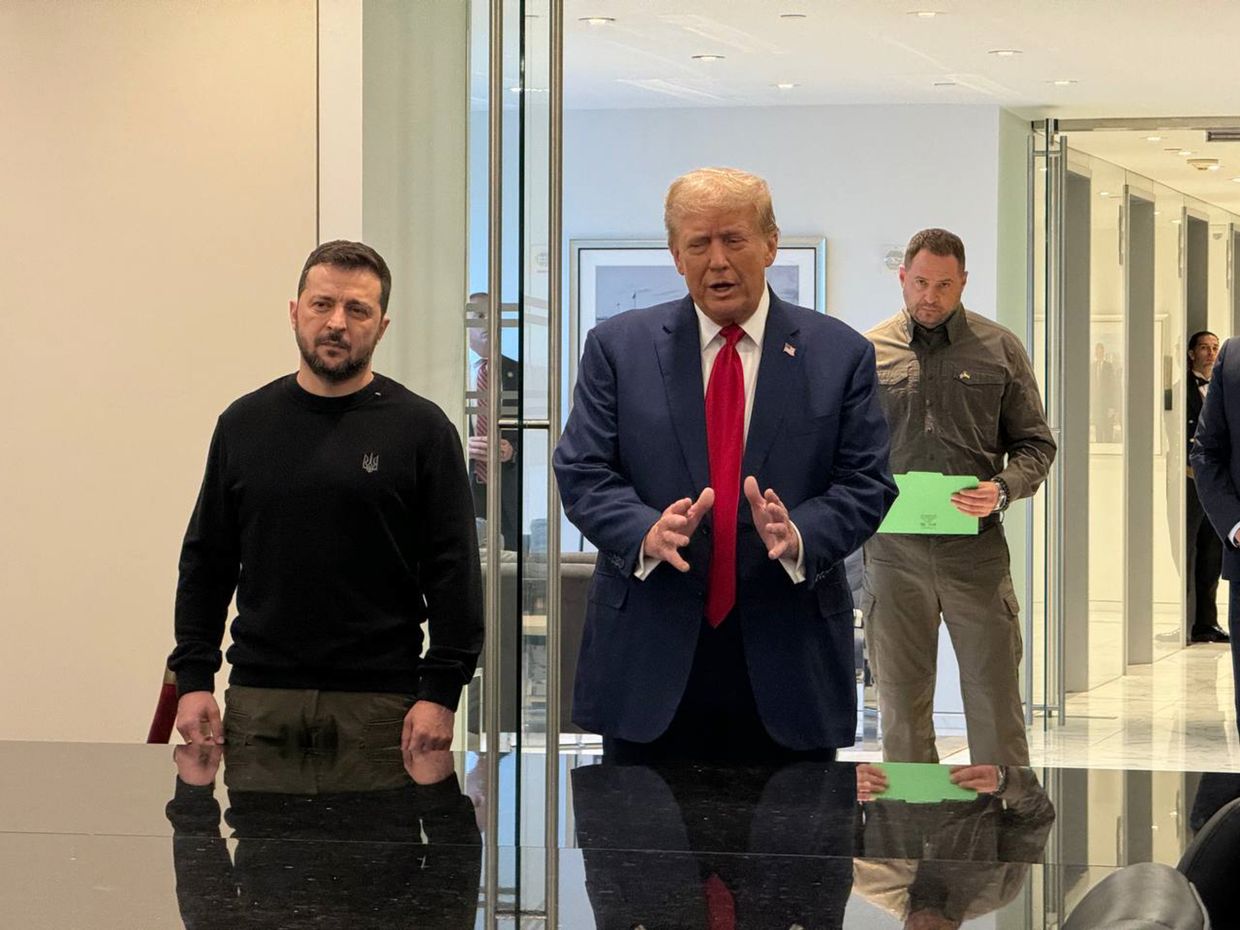Mykola Melnyk was awarded the Order of Bohdan Khemelnytsky for surviving his injuries while serving as a company leader of Ukraine‘s 47th Mechanized Brigade. He spoke with the Kyiv Independent in Philadelphia, Pennsylvania, U.S.A. on June 22, 2020. (Linda Johnson/the Kyiv independent)
Donald Trump, 78, will be more powerful than ever on Jan. 20, with the Republican control of the Senate, and possibly of the House of Representatives.
While Trump’s campaign focused largely on domestic issues, concerns have loomed over his return in Kyiv due to Trump’s criticism of U.S. Military Assistance for Ukraine. The Ukrainian army has been fighting Russia’s full scale invasion for the third year.
Trump’s promise to end the war quickly, his fondness for Russian President Vladimir Putin and his criticism of Ukrainian president Volodymyr Zelensky during election campaigns also fuels concern that he may pressure Kyiv to accept a peace deal that would require a cession of some 20% of state land currently occupied by Russia.
“They said that he would start a conflict. I am not going to do so,” Trump said during a victory speech he gave early on Nov. 6. He added, “I will stop the wars.”
The Kyiv Independent asked Ukrainians living in the U.S. what they thought of Trump’s likely return to the White House.
Mykola Melnyk
Mykola Melnyk is a 39-year old officer of Ukraine’s Armed Forces, who served as the company commander of the 47th Mechanized Brigade. He has been in the U.S. since months, receiving treatment for the injuries he suffered during the 2023 Counteroffensive in Southern Ukraine.
Melnyk said: “Everyone knows it won’t be like under (outgoing U.S. president Joe) Biden, when aid continued to flow but was slowly and decreasingly.” “Now Ukraine aid is either going to increase or stop completely.”
Melnyk believes that Trump has contradicted his own statements about Russia and Putin so many times that he’s not sure what the future holds for Ukraine.
Melnyk stated that “Trump is a hostage of his voters.” “His supporters want to restore the U.S. back to its glory and putting Putin on his place could be an option to satisfy Trump’s voters.”
Dara Lesniak
Dara Lesniak, a member of the Ukrainian community in New York City, spent the months leading up to the election campaigning for U.S. backing of a Ukrainian win. She is the President of the Ukrainian Club at Columbia University.
Lesniak said, “I am not surprised by the results of the election but I’m worried about Ukraine’s future.”
Lesniak said that while Trump’s position on the war with Ukraine was unclear throughout the campaign, his rhetoric on the subject became more alarming as the election date approached. “His refusal to state that he wanted Ukraine’s victory in the presidential debate was especially concerning.”
Lesniak said that there was a lot of uncertainty surrounding Trump, but his choice of JD Vance as the next vice president for America was a turning point. She said that it is not clear whether Trump shares Vance’s isolationist views, but his actions as a former and future president suggest that he will move toward Vance’s seclusion.
Lesniak told her that she has heard from many Ukrainians that they fear Trump’s presidency could reduce the amount of U.S. assistance sent to Ukraine. Lesniak, despite this, is still optimistic.
“I believe that there is hope in the fact that we as advocates of Ukrainian victory will need to double our efforts next year.”
Taras Mahlay
Taras Mahlay is a medical professional who is also the board president of Cleveland Maidan Association. This nonprofit organization provides aid to Ukraine. Taras is concerned about the deaths in Ukraine caused by the war between Russia and Ukraine and the unpredictable future of Trump’s administration.
Mahlay, who organizes the aid sent to Ukraine is concerned about war fatigue. He worries that it could affect America’s willingness and ability to donate money and resources for efforts like his. He wants an administration to continue to send humanitarian and militarily aid to Ukraine, but is unsure if Trump will.
Mahlay is concerned that Trump’s plan for ending the war in Ukraine quickly involves ceding Ukrainian land and that his understanding is only through the lense of land loss, not human suffering.
What happens to the people who are hiding behind the curtain if we stop the war? Mahlay said, “That’s my concern.” “If it were a simple matter of giving up the land, then I think we would just give up the (land), but it’s not just the land. It’s also the people, our culture, and everything else that’s there other than the physical land.”
Mahlay said that he was worried about what Trump will bring, not only for Ukraine, but also for the rest of the world.
Nataliya DeMarco
Nataliya DeMarco is a Ukrainian American who lives in Pennsylvania. She said she was disappointed.
DeMarco said, “As a proud Ukrainian American woman, I am heartbroken and in disbelief at the choice of an incompetent president by the American people.”
She said that Trump’s victory would have repercussions far beyond Ukraine.
“Sadly, this decision will have serious consequences for the future of our children and grandchildren, as well as for Ukraine.”
Andriy Boechko
Andriy Bechko, who lives in Parma, Ohio, and moved to Lviv, Ukraine’s western region, in the 1990s from Lviv, there is uncertainty following Trump’s win.
“Trump never presented any actual foreign policy plans, just some vague ideas,” said he. “He has also a history of flip flopping on major topics.”
Boechko, a registered independent, voted for Kamala Harris because he believed that she was better for Ukraine. He’s now resigned to a cautious optimism.
“I think Trump is more decisive, and he has people on his team who are supportive of Ukraine.”
He says that nothing will change for the residents of a vibrant Ukrainian community in northeast Ohio, one of the largest Ukrainian Diaspora concentrations across the country.
Boechko said, “I will continue to do my part to help Ukraine.” “It’s the responsibility of each Ukrainian to do this.”
Owen Racer is a freelance journalist based in New York City. He has contributed to National Public Radio stations such as WHYY, WVXU and WWNO. Cincinnati-native, John A. Smith, has also contributed to KFF Health News, American City Business Journals and other publications. He studied journalism at the Craig Newmark Graduate School of Journalism and economics at the University of Cincinnati. Read more
Read More @ kyivindependent.com
